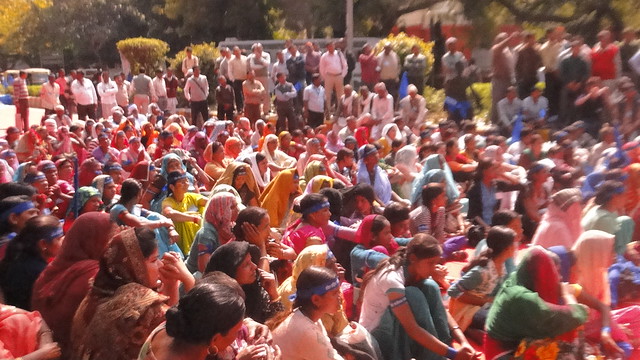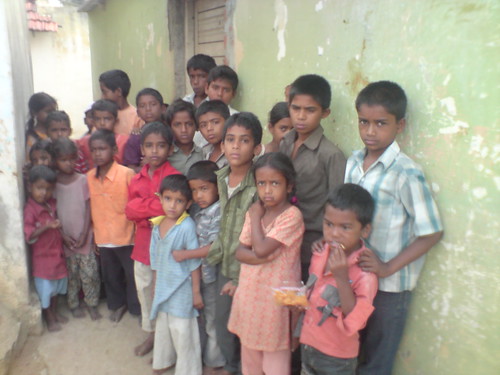By Ravichandran Chakkiliyan, TwoCircles.net,
On May 12TH, 2014 Dalit Stree Shakti, an organization based in Hyderabad fighting against violence on dalit women organized a seminar on “Judiciary and its Functioning” in the memory of Lakshmipeta dalits, a place in Srikakulam where 7 dalits were beaten to death by Thoorupu Kapu (men/women) (Backward Caste) in 2012. The Meeting was organized in Ravindra Bharati, Lakdikapool, Hyderabad.
Many dignitaries were present in the meeting, all of them expressed their view on Judiciary and how to democratize the Judiciary. Kancha Ilaiah while speaking said in India “there are three different laws 1. Dive law, 2. Social law, 3. Constitutional law” among which the Divine law (Religiously sanctioned) has its upper hand than any other laws. It is this law that sanctions the violence on dalit/men/women.

Justice Lakshman Rao said “We should bring changes not in law rather in the way we think, such a movement should be lead under the women movement”. Mazhar Hussain (COVA founder) said there are two holy cows which cannot be spoken about, 1. Armed Forces, 2. Judiciary. Corruption are in the core of these two bodies. He also said we should have our legal watch to monitor the cases registered and the Judgments pronounced. Kaki Madhava Rao, ex Chief Secretary of Andhra Pradesh says that “the public prosecutors are appointed based on their political support they have, rather than their credibility” and said “Re-employment of Judges after their retirement has to be stopped.”
Dalit Stree Shakti while commenting on the topic said “The Judiciary has been always against Dalits, she referred to Satyam Babu case, where falsely he was implicated and sentenced to life”. While in the court when the Judge was pronouncing the verdict he asked Satyam final comment on the case, Satayam Said
“If the court believes that I am guilty, I am ready to even face death penalty. .” (The Hindu)
One of the AP High Court Advocates Ms. Jajula Gowri said she took the profession religiously but she felt ashamed while practicing and said that corruption is prevalent in Judiciary, she was saying to move a file you should pay money, for every movement of a case we have to pay money as bribe in the court.
Overall all those present raised their concern over the unaccountability of the Judiciary in India. At this point it is worth mentioning two different cases and the public responses. In Mumbai Campa Cola residents are protesting against the eviction order given by Bombay Municipality Corporation (BMC). The residents went to court, trial court, High Court and Supreme Court, all the courts said eviction can be stopped. The residents pleaded to regularize the constructed illegal flats. It is the case of Campa Cola Vs The state of Maharastra, which said the Campa Cola residents who are staying above the prescribed number of flats should vacate for demolition as it is illegally constructed. The English and electronic media are broadcasting the views of Campa Cola residents, and trying to create a public opinion against their eviction. Recently MNS also came in support of the residents and Lata Mangeshkar (who also owns a flat in Campa Cola) (TOI) twitted against the eviction. But few important points are missing in these discussion. It is worth looking the SC judgment, developers without permission and despite stop-work notice, carrying on with illegal residential constructions and selling them to individual buyers and with the passage of time, said individual buyers seeking regularisation of said illegal constructions and also seeking quashment of demolition orders. (357 P)
The developers pleaded that the buyers cannot plead ignorance because as was evident from the agreements, the buyers were aware that the revised plans had not been sanctioned and that construction had been made despite the stop-work notice. (359 p)
In this scenario, the only remedy available to them is to sue the lessee and the developer/builder for return of the money and/or for damages and they cannot seek a direction for regularization of illegal and unauthorized construction made by the developers/builders. (361)
In Economic Times it says the residents gave 14 conditions for vacating the illegal flat construction. (Economic times)
Let us consider the other example where many dalits/adivasis are evicted for the purpose of constructing a railway line, over bridge or even for the development projects. Did any of us hear a story of them have a capacity to approach these many courts and still protest, and the electronic media supports such eviction claiming the development is mandatory. Or these Media organizations remain mute to these evictions, the Polavaram Project would be a crucial case, where The Hindu reports ” If constructed, Polavaram will not only submerge large tracts of tribal lands displacing lakhs of Adivasis and snatching away their livelihood options including bamboo craft, but spell doom for Konda Reddi tribal people whose population is on the decline”

Another classic case in recent past in Hyderabad is the eviction of Adivasis near LB Nagar. These adivasis have been living here for around 70 years and when they started to live there were no development in the area, now around their area big multi complexes were built and flats too built. These Adivasis came to know that the land is being encroached by the land mafia with the support of political parties and bureaucrats and police. Though Adivasis took a stay order some years back but the land mafia came at night and removed their tent, immediately all of the adivasis protested and blocked the main road. After few days the land mafia came with goons and beat all of them at night (Watch Dalit Camera video, and read Karthick blog) and took them in a vehicle and dropped everyone in different places and also removed all their houses. Now just imagine here Adivasis are claiming their constitutional rights but the state did not support it. In the Campa Cola case they are overlapping the constitutional rights but they get good support. It is in this angle we should see how the Judicary, the body to uphold the constitutional rights are hostile towards justice and mostly influenced by the dominant Savarna Caste ideology.
And many dignitaries present in the meeting expressed that Judges are also human being having caste identity and its important to discuss these issues publicly. The Press note of the RTC also says I quote:
“…of late, many scandals of corruption, sexual harassment involving judges of various courts have come to light. The scandal of provident fund in Ghaziabad, and the allegations on Dr. A. S. Anand that when he was Chief Justice of India in 2000, an affidavit through his wife was manipulated in Madhya Pradesh to claim the compensation of about 1 crore and that he tampered with date of birth are some of the serious ones. Former law minister Shanti Bhushan created a sensation in the Supreme Court when he moved an application accusing eight former Chief Justices of India of “corruption”, and dared the court to send him to jail for committing “contempt of court”. There was also a CBI confirmed instance of cash-in-bag scam involving an amount of Rs 15 lakhs in 2008 against former Punjab and Haryana High Court judge Nirmal Yadav. V.N. Khare, former Chief Justice of India openly commented that ‘Corruption Is Rampant In The Lower Courts’, like wise, talking about corruption in lower judiciary, Madras High Court Chief Justice M Y Eqbal said: “At present there are about 500 petitions under the scrutiny of High Court as against about 900 judicial officers working now. West Bengal Chief Minister Mamata Banerjee openly commented that a section of the judiciary was corrupt and that court judgments have been bought for money. Similar were the comments of DMK Chief, Karunanidhi who said there is a price for every judgement. Within the Judiciary, a Bench consisting of Justice Markandey Katju and Justice Gyan Sudha Misra said that most judges of this High Court are corrupt and collude with advocates and that the Allahabad High Court was rotting.”
The meeting was a start in democratizing the Judiciary, as this is the body to look after the implementation of the constitution. And many of the dalit movement in AP are looking into Supreme Court Cases and High Court to study and interpret these judgements.

